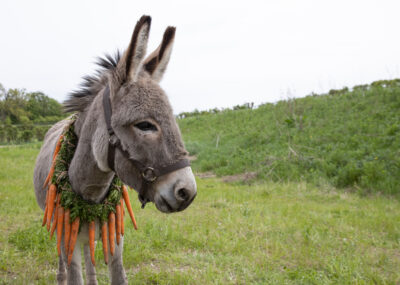
“A potent emotional charge, very contemporary eco-consciousness, and film-making that at its best fairly sizzles in its strangeness mark out EO as an animal film that stands defiantly on its own hooves.” ~ Jonathan Romney, Screen International
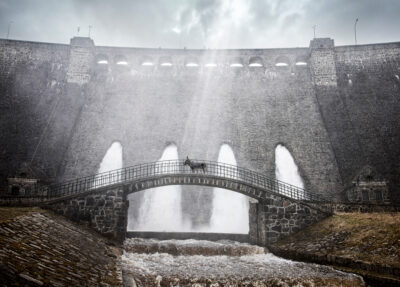

“A potent emotional charge, very contemporary eco-consciousness, and film-making that at its best fairly sizzles in its strangeness mark out EO as an animal film that stands defiantly on its own hooves.” ~ Jonathan Romney, Screen International

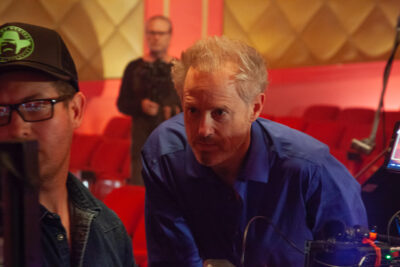
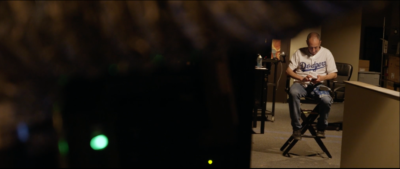
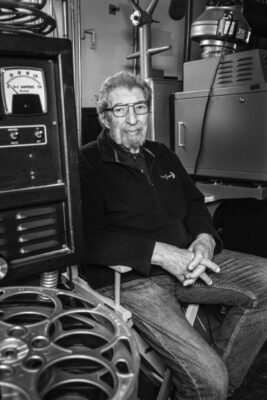
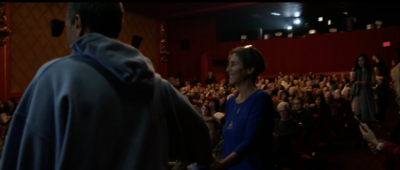
Eternal Spring director Jason Loftus and subject-animator Daxiong will participate in Q&As at the Royal following the 7:10 PM screening on Saturday, November 19 and the 1:20 screening on Sunday, November 20. Matt Carey will moderate.
Winner of the World Cinema Grand Jury Prize this year at Sundance, Utama is set in the arid Bolivian highlands and follows an elderly Quechua couple that has been living the same daily routine for years. While he takes their small herd of llamas out to graze, she keeps house and walks for miles with the other local women to fetch precious water. When an uncommonly long drought threatens everything they know, Virginio and Sisa must decide whether to stay and maintain their traditional way of life or admit defeat and move to the city with their descendants. Their dilemma is precipitated by the arrival of their grandson Clever, who comes to visit with news. The three of them must face, each in their own way, the effects of a changing environment, the importance of tradition, and the meaning of life itself. (Watch the trailer.)

This visually jaw-dropping debut feature by photographer-turned-filmmaker Alejandro Loayza Grisi is lensed by award-winning cinematographer Barbara Alvarez (Lucretia Martel’s The Headless Woman).
We open Utama Friday at the Royal. Loayza Grisi and producer Santiago Loayza Grisi will participate in Q&As after the 7:30 PM screenings on Friday and Saturday, November 11 and 12. Moderators: Friday – Carlos Aguilar (Los Angeles Times, New York Times); Saturday – Katie Walsh (Los Angeles Times, The Wrap).
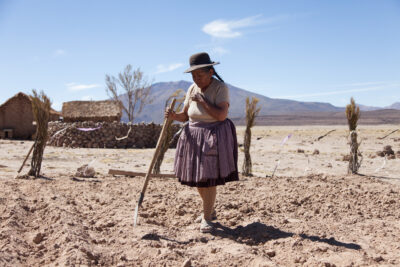
“Sublime. From the breathtaking opening shot… the film looks unlike anything else.” – Variety
“Meditative and deeply romantic. Rarely has the [climate] crisis been addressed as organically—or with quite so many llamas.” – RogerEbert.com

“Visually stunning… combines magical realism with gorgeously precise cinematography. The images conjured in Utama momentarily let us into the language of the unknown, of what we can not comprehend unless we are as in tune with the land as those whose existence is so deeply tied to it.” – IndieWire
Utama is one of several Best International Oscar competitors that we’re already screening, with more to come, including:
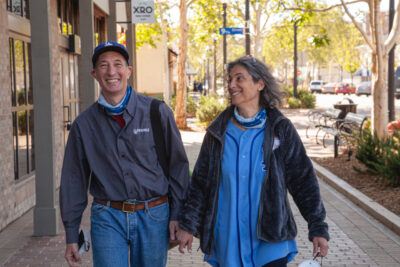
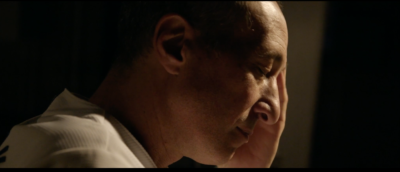
Laemmle Theatres is pleased to announce that veteran film critic Stephen Farber’s popular REEL TALK WITH STEPHEN FARBER screening series is moving to Laemmle’s Monica Film Center this fall! See a variety of outstanding films from the U.S. and around the world, including many top awards contenders. Then meet the filmmakers for provocative and revealing discussions led by Stephen. The first screening — CALL JANE — will be October 17 and special guests will be announced soon. Visit laemmle.com/reeltalk for updates.
Recent films and speakers at Reel Talk have included:
MRS. HARRIS GOES TO PARIS, with director Anthony Fabian;
THE PHANTOM OF THE OPEN, with actors Christian Lees and Jonah Lees;
HAPPENING, with director Audrey Diwan and actress Anamaria Vartolomei;
THE UNBEARABLE WEIGHT OF MASSIVE TALENT, with director/co-writer Tom Gormican and co-writer Kevin Etten;
OPERATION MINCEMEAT, with screenwriter Michelle Ashford;
FIDDLER’S JOURNEY TO THE BIG SCREEN, with producer Sasha Berman and co-writer Michael Sragow;
AS THEY MADE US, with writer-director Mayim Bialik.
The beautiful new documentary feature Three Minutes: A Lengthening is based on a mere three minutes of footage, shot by David Kurtz in 1938, that are the only moving images remaining of the Jewish inhabitants of Nasielsk, Poland before the Holocaust. Director Bianca Stigter takes those three minutes and expands and explores them to create “an original and incisive meditation on history, memory, memorials and the very nature of celluloid.” (Alissa Simon, Variety) We open the film August 19 at the Royal and August 26 at the Town Center. The August 16 at the Royal will be hosted by the Los Angeles Jewish Film Festival and followed by a discussion with Ms. Stigter and author Glenn Kurtz. Scholar Michael Berenbaum of American Jewish University will moderate.
Director Bianca Stigter’s statement:
“As a child, David Kurtz emigrated from Poland to the United States. In 1938 he returned to Europe for a sightseeing trip and whilst there he visited Nasielsk, the town of his birth. Specifically for this trip, he bought a 16mm camera, then still a novelty rarely seen in a small town never visited by tourists. Eighty years later his ordinary pictures, most of them in color, have become something extraordinary. They are the only moving images that remain of Nasielsk prior to the Second World War. Almost all the people we see were murdered in the Holocaust.
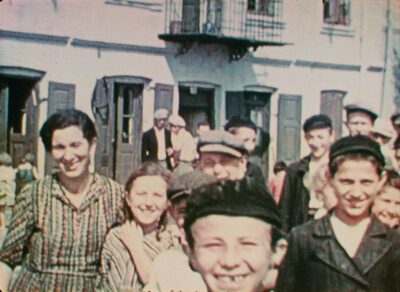
“On Facebook, I stumbled upon a book written about this film, Three Minutes in Poland by Glenn Kurtz. The title fascinated me. I ordered the book and watched the footage, which can be found on the website of the United States Holocaust Memorial Museum. While watching, I wondered: could you make those three minutes last longer, to keep the past in the present?
“For this film essay, I examined the footage in the fullest detail, to see what the celluloid would yield to viewers almost a century later. The footage is treated as an archaeological artifact to gain entrance to the past.
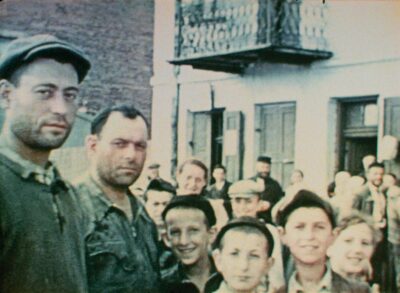
“I contacted Glenn Kurtz, traveled to Nasielsk to see if any traces remained from the past, and went to Detroit to speak with survivor Maurice Chandler and his family.
“After this extensive research, I edited the footage in different ways to bring to life as many of the facts and stories about Nasielsk as possible. A few seconds of the recording of a café becomes a dance scene, a single shot of the market square tells the story of the deportation of its Jewish citizens. All the faces that appear in the film are singled out and magnified to pay homage to the people of Nasielsk. The old images of the Polish town are combined with the way Nasielsk sounds today, creating a tense fusion of the past and the present.
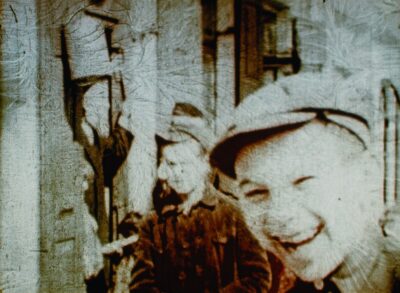
“Three Minutes: A Lengthening is an experiment that turns scarcity into a quality. Living in a time marked by an abundance of images that are never viewed twice, we do the opposite here: circle the same moments again and again, convinced that they will give us a different meaning each time. The film starts and ends with the same unedited found footage, but the second time you will look at it quite differently.
“Three Minutes: A Lengthening investigates the nature of film and the perception of time. Through the act of watching, the viewers partake in the creation of a memorial.”
“When apparatuses like these are available to the public, when everyone can photograph those who are dear to them, not only their posed forms but their movements, their actions, their familiar gestures, with words at the tip of their tongues, death will cease to be absolute.’’ ~ The French newspaper La Poste, 30 December 1895, after the Lumières’ first public showing of a film in Paris.
